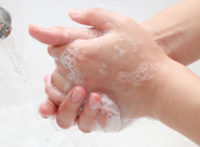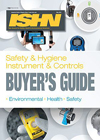Why wash your hands?

Momma always said: Keeping your hands clean is one of the most important things you should do to avoid getting sick and spreading germs to others. Many diseases and conditions are spread by not washing hands with soap and clean, running water.
Germs can get onto hands after people use the toilet or change a diaper, but also in less obvious ways, like after handling raw meats that have invisible amounts of animal feces on them. A single gram of human feces — about the weight of a paper clip — can contain one trillion germs. Germs can also get onto hands if people touch any object that has germs on it because someone coughed or sneezed on it or was touched by some other contaminated object. When these germs get onto hands and are not washed off, they can be passed from person to person and make people sick.
Handwashing with soap removes germs from hands. This helps prevent infections because:
- People frequently touch their eyes, nose, and mouth without even realizing it. Germs can get into the body through the eyes, nose and mouth and make us sick.
- Germs from unwashed hands can get into foods and drinks while people prepare or consume them. Germs can multiply in some types of foods or drinks, under certain conditions, and make people sick.
- Germs from unwashed hands can be transferred to other objects, like handrails, table tops, or toys, and then transferred to another person’s hands.
- Removing germs through handwashing therefore helps prevent diarrhea and respiratory infections and may even help prevent skin and eye infections.
Source: The Centers for Disease Control and Prevention www.cdc.gov
Looking for a reprint of this article?
From high-res PDFs to custom plaques, order your copy today!






